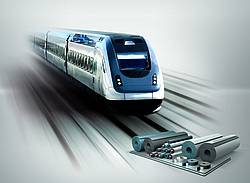Münster, 26 August 2015 – Greater safety in a fire; reliable condensation control on refrigeration pipes and air ducts; covered and halogen-free materials now also available.
Following the successful launch of ArmaFlex Rail SD, Armacell has now extended its range of flexible, closed-cell insulation materials for railway vehicle construction. All ArmaFlex Rail products meet the high requirements of the new European fire protection standard EN 45545. They achieve hazard level HL2 or 3 and can even be installed in sleeping cars and couchettes which are operated on underground track sections or in tunnels. The completely new materials – including halogen-free and covered insulation materials – have very good fire properties and develop extremely little smoke. ArmaFlex Rail products protect refrigerant pipework, air ducts and other components against energy losses and condensation. Because the products are highly flexible, installation is unbeatably fast and easy. The elastomeric insulation tubes and sheets are only sold to original equipment manufacturers (OEMs) in the railway vehicle sector.
Watch the ARMAFLEX Rail Video on YouTube
ArmaFlex Rail products at a glance
Armacell provides innovative system solutions for insulating refrigeration and air-conditioning systems in vehicles ranging from trams to high-speed trains. The new technologies ensure more safety and comfort on the tracks.
ArmaFlex Rail SD
Elastomeric insulation material with improved flame- retardant properties and low smoke density achieves HL2, R1 under EN 45545 and is also classified under the national fire protection standards NFPA 130, GOST 12.1.044-89 and DIN 5510-2. ArmaFlex Rail SD is equipped with Microban® technology for additional protection against bacteria and mould contributes to a healthy indoor climate. This product is currently being installed in the double-deck trains which Swiss railway vehicle manufacturer Stadler Rail is building for Aeroexpress, a Russian railway operator.
ArmaFlex Rail SD-C
The first closed-cell insulation material for use in areas requiring the highest hazard level – HL3. The product is based on ArmaFlex Rail SD and is equipped with a shiny, silver covering. The attractive surface is UV-resistant, protects the insulation material against mechanical impact and is very easy to clean.
ArmaFlex Rail ZH
The first halogen-free, closed-cell insulation material to achieve the classification HL2, R1 under EN 454545. The product not only has very good flame-retardant properties and low smoke density, it also minimizes the risk of secondary damage. Acidic fire gases cause damage to property leading to costs many times higher than those of the actual fire loss. In a fire, the halogen-free ArmaFlex Rail ZH does not release corrosive gases which, in combination with the fire-fighting water, could form aggressive acids.
ArmaFlex Rail ZH-C
The first halogen-free, closed-cell insulation material for applications with the highest requirements regarding the materials used. ArmaFlex Rail ZH-C achieves hazard level HL3, R1 can even be used in sleeping cars and couchettes which are rated operating class 4 and run on underground track sections or in tunnels. The shiny metallic, UV-resistant covering is easy to clean and so flexible that it regains its shape after mechanical impact such as knocks and blows.
Tighter fire protection requirements for railway vehicles
In a fire, low smoke density can be of vital importance in order to allow passengers and staff to escape and be rescued quickly and safely. For this reason, the new European standard EN 45545-2 defines tighter requirements for the fire behaviour of materials and components. The fire protection standard came into force in August 2013. During the transition period it applies alongside the national standards (such as BS 6853, DIN 5510, NF F-16101), which must be withdrawn by March 2016. To achieve the highest possible level of safety in trains the materials and components must meet strict fire protection requirements under EN 45545. Depending on where they are used, materials are assigned to the categories R1 to R26 (R = Requirement Set). The various operating and design classes provide the basis for the hazard levels (HLs) which in turn define the requirements of the classification system. There are a total of three hazard levels (HL1 to HL3). HL3 is the highest level and thus makes the highest demands of the materials used. In accordance with their classification as R1 materials, technical insulation materials are tested under ISO 5658-2 (spread of flame), ISO 5660-1 (heat release, smoke development and mass loss rate) and EN ISO 5659-2 (optical smoke density and smoke gas toxicity).
Technical insulation materials have to meet many different requirements
ArmaFlex Rail products are closed-cell insulation materials with low thermal conductivity and high resistance to water vapour transmission. Therefore they provide installations with reliable, long-term protection against energy losses and condensation. As is the case with all ArmaFlex products the ArmaFlex Rail products have a ‘built-in’ vapour barrier. Unlike conventional insulation materials which have to be protected against moisture penetration with a separate vapour barrier, in ArmaFlex the resistance to water vapour transmission is built up throughout the entire insulation thickness. The Microban® technology provides additional protection against harmful microbes such as bacteria and mould.
Neat and simple installation
The new ArmaFlex Rail products are supplied as tubes, sheets, self-adhesive sheets and tapes in the usual insulation thicknesses. A great advantage of the synthetic rubber, which becomes particularly apparent in the tight installation situations in rail vehicle con¬struction, is the highly flexible nature of the material. The homogenous, three-dimensionally linked structure of the elastomeric insulation allows the sheets to be cut neatly without the release of dust or fibre particles which could pose a health threat if breathed in. The high flexi¬bility of the material allows it to be fitted simply even on complex fittings and equipment. Application times can be further reduced by using self-adhesive sheets.
